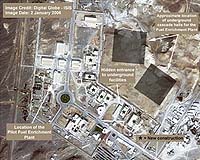 |
Washington (AFP) Feb 9, 2010 US President Barack Obama said Tuesday the international community was moving "fairly quickly" to impose new sanctions on Iran after Tehran started enriching uranium to a higher level. The president issued his remarks as his administration marks major progress in persuading Russia to overcome its traditional resistance to imposing new sanctions on Iran, even if it still faces opposition from China. Obama was asked in an impromtu appearance in the White House briefing room how quickly the six key world powers were moving to toughen a regime against Tehran given Iran's enrichment activity. "It's moving along fairly quickly," Obama said, referring to the negotiations involving the United States, Russia, China, France, Britain and Germany. "Despite the posturing that the nuclear power is only for civilian use ... they in fact continue to pursue a course that would lead to weaponization, and that is not acceptable to the international community," he said. In Moscow, the powerful head of Russia's national security council, Nikolai Patrushev, said Tehran's announcement that it has started work to produce 20 percent enriched uranium cast doubt on its claims not to be pursuing weapons. Patrushev indicated the Kremlin's patience in trying to seek dialogue with Tehran was wearing out. "Iran claims it is not trying to acquire nuclear weapons," Patrushev was quoted as saying by Russian state news agencies. "But actions such as starting to enrich low-enriched uranium up to 20 percent raise doubts in other countries and these doubts are fairly well-grounded," Patrushev added. "Political and diplomatic methods are important for regulating, but everything has its limit," Patrushev was quoted as saying. His comments were an unusual expression of concern from Moscow, which has long said there was no evidence that Iran was pursuing anything other than a civilian nuclear energy program. China was alone among the six powers in calling for more talks to resolve the impasse. "We hope the relevant parties will exchange views on the draft deal on the Tehran research reactor and reach common ground at an early date which will help solve the issue," foreign ministry spokesman Ma Zhaoxu said. Ahmet Davutoglu, the foreign minister of Turkey, a country with good ties with both Iran and the West, is to visit Iran next week to push for a diplomatic solution to the stand-off. Washington has called the latest Iranian moves "provocative" and is pressing ahead with moves at the UN Security Council for a fourth sanctions resolution against Iran. US Defense Secretary Robert Gates "thinks this is a matter of weeks, not months," Pentagon spokesman Geoff Morrell told reporters in Paris, where Gates met French President Nicolas Sarkozy. "He thinks that we need it and that we can do it in that time," Morrell added. "In all his meetings he discussed this sense of urgency." State Department spokesman Philip Crowley said the Iranian decision to further enrich uranium "puts us in a much stronger position" to move ahead with plans to put "pressure" on the Iranian government rather than its people. US officials have discussed sanctions targeted on Iran's Revolutionary Guard, which is responsible for the country's nuclear program and is behind the crackdown on anti-government protests. "Iran is increasingly isolated," Crowley told reporters in Washington. The loudest call for sanctions came from Israel where Prime Minister Benjamin Netanyahu called for "crippling" measures against Tehran during a gathering of European Union ambassadors in Jerusalem. In a further sign of rising tensions over the nuclear issue, around 100 pro-government militia members tried to storm Italy's embassy in Tehran, Italian Foreign Minister Franco Frattini told a Senate hearing. Similar protests took place outside the French and Dutch missions in Tehran, Frattini said. On Monday, Sarkozy and Gates agreed to push for "strong" new anti-nuclear sanctions against Iran, which insists its atomic drive is to produce energy. Brazil, which enjoys good relations with Iran and is among the non-permanent members of the 15-member UN Security Council, on Tuesday resisted moves to sanction Iran. "We don't believe that sanctions will prove effective," Brazilian Foreign Minister Celso Amorim told reporters.
Share This Article With Planet Earth
Related Links Learn about nuclear weapons doctrine and defense at SpaceWar.com Learn about missile defense at SpaceWar.com All about missiles at SpaceWar.com Learn about the Superpowers of the 21st Century at SpaceWar.com
 Defiant Ahmadinejad orders higher enrichment of uranium
Defiant Ahmadinejad orders higher enrichment of uraniumTehran (AFP) Feb 7, 2010 President Mahmoud Ahmadinejad on Sunday ordered Iran's atomic chief to begin higher uranium enrichment, raising the stakes in a dispute with the West days after seeming to accept a UN-drafted nuclear deal. Ahmadinejad's declaration drew immediate fire from Britain, which said it was "clearly a matter of serious concern," while US Defence Secretary Robert Gates called for mounting "internatio ... read more |
|
| The content herein, unless otherwise known to be public domain, are Copyright 1995-2010 - SpaceDaily. AFP and UPI Wire Stories are copyright Agence France-Presse and United Press International. ESA Portal Reports are copyright European Space Agency. All NASA sourced material is public domain. Additional copyrights may apply in whole or part to other bona fide parties. Advertising does not imply endorsement,agreement or approval of any opinions, statements or information provided by SpaceDaily on any Web page published or hosted by SpaceDaily. Privacy Statement |